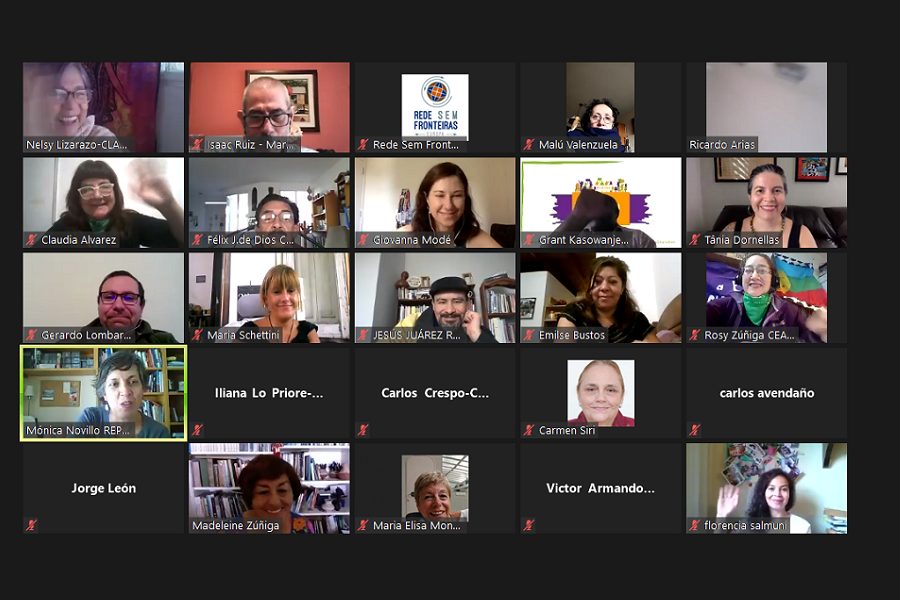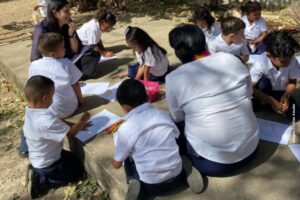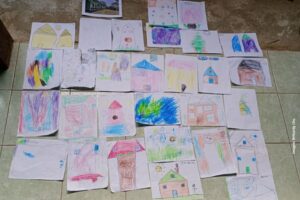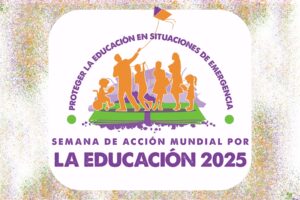With the participation of a hundred delegates from organizations that converge around education as a human right, the self-organized assembly “Towards a global agenda: the human right to education from the movements” was held this Saturday (30) in the framework of the World Social Forum (WSF) 2021.
The activity was organized by the Latin American Campaign for the Right to Education (CLADE), the Council for Popular Education in Latin America and the Caribbean (CEAAL), the Pressenza Agency, the Espacio sin Fronteras Network, the Global March against Child Labour, the Global/Local Network for Quality Education, the Popular Education Network of Women (REPEM), the World Organization for Early Childhood Education (Omep) and Fe y Alegría.
Opening the dialogue, Grant Kasowanjete, Global Coordinator of the Global Campaign for Education, highlighted the need to ensure increased funding for public education in the countries of the global South as one of the main challenges to realizing the human right to education.
She pointed out that “for every dollar of aid that arrives from the global North, ten dollars are taken away through foreign debt and other mechanisms”, which erodes public coffers and underfunds the system, since 90% of education budgets come from own resources.
Nelsy Lizarazo, from the general coordination of CLADE, emphasized the deepening as result of the pandemic, of pre-existing inequality gaps and a refinement of stratification and exclusion from the educational pathway in social sectors lacking support, connectivity or adequate equipment, highlighting rural populations, migrants, indigenous people and people with disabilities, among others.
At the same time, she indicated how governments have handed over millions of dollars and data to corporations, information that will feed the already enormous business of these technology multinationals. She also added that the emergency has meant a greater precariousness of the teaching condition with budget reductions, salary reductions, a heavier workload, to which is added the psychological pressure produced by the effort of educators to respond to and overcome the difficulties posed by the technological and pedagogical challenge of distance education.
On the basis of these characterizations, the question of the learning, strengths and challenges identified in this course was launched as a trigger.
In a first round of interventions, key aspects such as the lack of infrastructure and the need for community technological development independent of large corporate platforms, the damage caused by the exclusion of millions of children from the educational process or the dysfunctionality of homogeneous educational planning in the face of the complexity of diverse realities were pointed out.
Among the lessons learned, the imaginative capacity of the educators who managed to overcome adverse conditions, the propensity for knowledge of children beyond the institutional framework, the importance of dialogue and joint work between school, parents and community, the role of community education together with the favorable impact of progressive political projects in the face of the failure of the neoliberal system were valued.
The assembly continued its collective reflection on the priority agenda of the regions and what is common to these agendas.
In a fluid and propositional dialogue, the participants indicated that the struggle must lead first and foremost, in the face of the prevailing violence in different territories, to guaranteeing the right to life. Likewise, to overcome inequality at educational levels within the social system, to offer safe educational spaces, free of aggression and abuse for girls and boys, and to strengthen a new non-predatory social relationship.
The need to promote a political-pedagogical revolution in the face of neoliberal agendas was also pointed out, as well as the need to strengthen intergenerational dialogue, especially in relation to older adults and the importance of implementing Comprehensive Sex Education as a mechanism to overcome sexual violence against girls, adolescents and women in general.
On the other hand, global priorities included the struggle to ensure that the right to education is not minimized, the defense and strengthening of the public system and counteracting the fallacy that private systems are better, overcoming inequality and discrimination in education, and guaranteeing adequate funding for education from a human rights perspective.
When analyzing possible cross-cutting themes for common action, the indivisibility of human rights was emphasized and, consequently, it was proposed to promote broad alliances by interweaving struggles with the agendas of other rights while contributing to strengthening social organization and mobilization. The importance of continuing to generate knowledge by connecting it with messages and campaigns that mobilise demands was highlighted.
In the same way, a suggestion was made in the debate for a greater exchange on the modalities used to make good practices visible and to achieve effective impact in relation to the demands put forward.
Among the proposals for joint action, the creation of an observatory, the promotion of liberating education in the presence of Paulo Freire’s centenary, the opening of spaces for the expression of the new generations and the idea of Good Living were suggested. Political action is needed to rethink education in terms of feminism and socio-economic equity, and to articulate the forces to overcome not only the physical but also the mental illness from which humanity suffers.
Finally, the Assembly approved a text to be proposed and included in the final declaration of the World Social Forum 2021.
“In the framework of this WSF 2021, we join the agenda of transformation at the global level, articulated to the various fields of social struggle and rights, recognizing the catalytic role of education. The pandemic highlighted the historical inequalities within and outside education systems, affecting women, girls, people with disabilities, refugees and migrants, indigenous communities, rural populations, among others. It also highlighted the digital divide and government responses to it, as well as the need to build a digital sovereignty strategy.
Through strengthened public education systems, it is necessary to resist the threats of fiscal austerity policies, national indebtedness and cuts in education funding, as well as the multiple trends of privatization. From early childhood through to youth and guaranteeing adult education, it is essential, in the post-pandemic period, to rethink the meaning and purpose of education, in the search for the rights of peoples and overcoming patriarchy. A heterogeneous and intercultural model, transformative and inclusive; based on dialogue and safe for communities; valuing their knowledge and local knowledge, as well as collaboration in solidarity and commitment to the protection of life”.






